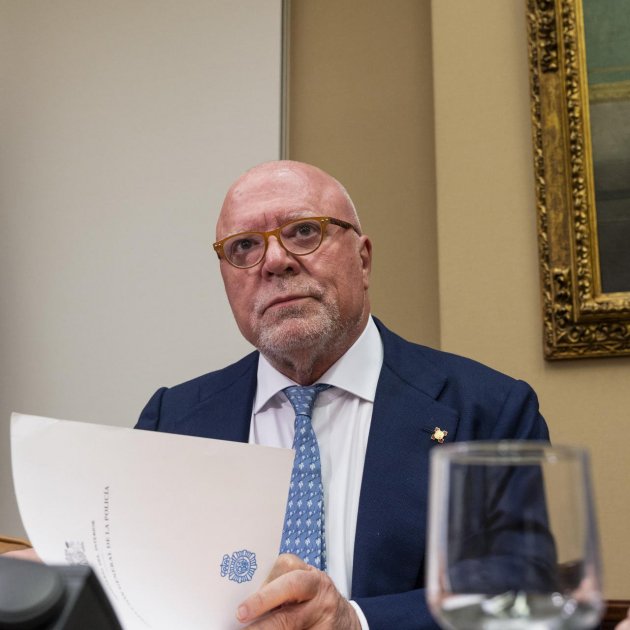Former police commissioner José Manuel Villarejo has set in motion the third commission of inquiry in Spain's Congress of Deputies centred on Operation Catalonia. In his appearance this Wednesday, Villarejo once again positioned the leadership of Mariano Rajoy's Spanish government as the instigators of the campaign of illegal actions against the Catalan independence movement that began a decade ago. "It is an operation that was structured from the very bowels of the government prime ministership [a reference to Rajoy], it was carried out by the deputy PM [Soraya Sáenz de Santamaría], who was the one who controlled the CNI [intelligence agency]," explained the former police commissioner, who confirmed that the objective was "to prevent a well-organized and well-structured part of Spain, which is Catalonia, from maintaining the option of becoming independent." According to his version, the police officer also "collaborated" with the former general secretary of the then-governing People's Party (PP), Dolores de Cospedal.
"An operation of great importance"
He situated Spanish prime minister Rajoy as organizer and interior ministry Jorge Fernández Díaz and the CNI as the executors of the plans to damage the Catalan independence movement. In fact, Villarejo, who did not present any documentary evidence to back his forceful statements, considers that the MPs do not have the inquiry properly oriented. "It was a far-reaching operation that went far beyond the police. We, together with the Civil Guard and the CNI, structured it all, with each one having their role," he stressed when asked by PSOE deputy Felipe Sicilia, who raised doubts about the ex-commissioner's memory when he wanted to know if, in one of the meetings with Cospedal, Mariano Rajoy had congratulated him for the work done against the independence movement: "I think that I did speak with him, but everything was so fast and so urgent..."
To questions from the PP deputy Luis Santamaría, who presented the commission as a "court of exception" directed "against my party", Villarejo also affirmed that he also provided his espionage services during the periods under previous PSOE governments. With regard to this, he recognized that the Socialist executives "wanted to have some control over [1980s and 90s Catalan president] Jordi Pujol, although he never bothered them excessively." "We monitored telephone booths in some towns where Pujol received calls from his lawyer and from people he trusted," Villarejo admitted, later asserting that "the information was sent to the interior ministry," at that point led by [Socialist politician] Alfredo Pérez Rubalcaba. The fact is that, he explained, "Pujol was a nationalist, not an independentist." Thus, the intelligence efforts had the Pujol clan in their sights, "the spiritual leader", although he defined Artur Mas as "a delegate of Jordi Pujol".
From 3% to 7%
In the questions asked by the ERC deputy Gabriel Rufián, the former police commissioner has revealed that Catalan businessmen complained because, as a result of the PP's absolute majority in the Spanish elections of 2011, the Catalan party Convergència (CDC) began to ask the business community for 7% in commissions "to prepare for independence. “We received a succession of information in which businessmen were complaining because the usual 3% became 7% in order to obtain the structures of an independent country. They said it was excessive because independence was a pipe dream”, Villarejo stated.
With respect to this, and to the former police leader's long-running crusade against the CNI, he recalled that Soraya Sáenz de Santamaría approached leaders such as conservative Catalanist politician Josep Antoni Duran i Lleida, of the party Unió, to "sweeten" the relationship with his governing partners in Convergència, and brake the push towards independence.
The “ugly parts” of Operation Catalonia
After acknowledging that "ugly" things had been done within the framework of Operation Catalonia, Villarejo once again used the term sustito - "a little fright" - to describre the terror attacks on Barcelona and Cambrils in August 2017 and he confirmed that the insistence on persecuting the pro-independence leaders led to the deviation of the alerts being received by Spanish intelligence. He affirmed that "it was more important to pressure Catalonia to stop proceeding so intensively [towards independence], and there was no warning given of the security risk." In this regard, he insisted that he received a note which contained a warning of the presence of the imam of Belgium, who was the one who led the terrorist action, and "they threw this information away", he explained, "more time and more effort it could have been dedicated to avoiding it”.
And who's paying for this?
The financing of Operation Catalonia also came up in the conversation. Villarejo recognized that the actions outside the law were paid through "super-reserved funds" of the Spanish state, unlike the CNI's reserved funds, which are subject to parliamentary control through the official secrets committee. As he detailed, the funds were used to "obtain cooperation, organize speakers so there would be changes in the event that Convergència i Unió (CiU) won by an absolute majority [in 2012], and establish associations and organizations apparently against independence." As well as this, he asserted, with these funds, actions against the ex-lover of Juan Carlos I, Corinna Larsen, would have been paid.
Lukewarm start for the inquiry
Prior to Villarejo's appearance, the parliamentary groups agreed that they will bring a list of up to eight witnesses before the commission meeting scheduled for next week. It is another attempt by the commission of inquiry to get some momentum,after a failure of the parliamentary parties to agree on a list of those who will appear. In fact, the dispute between the PSOE and Podemos made it impossible for a definitive list to be agreed upon, and the only agreement they reached was due to the Basque Nationalist proposal, which only had two names: José Manuel Villarejo and the Andorran BPA bank partner Higini Cierco. With regard to this, the banker postponed his appearance for work reasons and will now appear after the municipal elections on May 28th.
